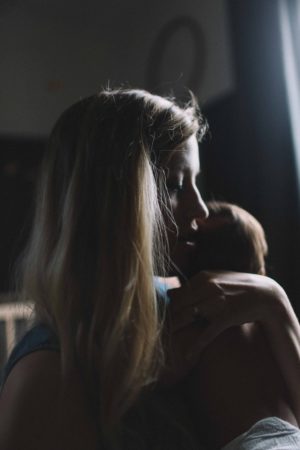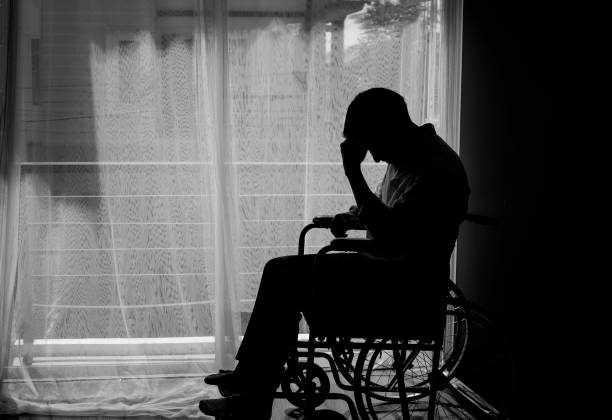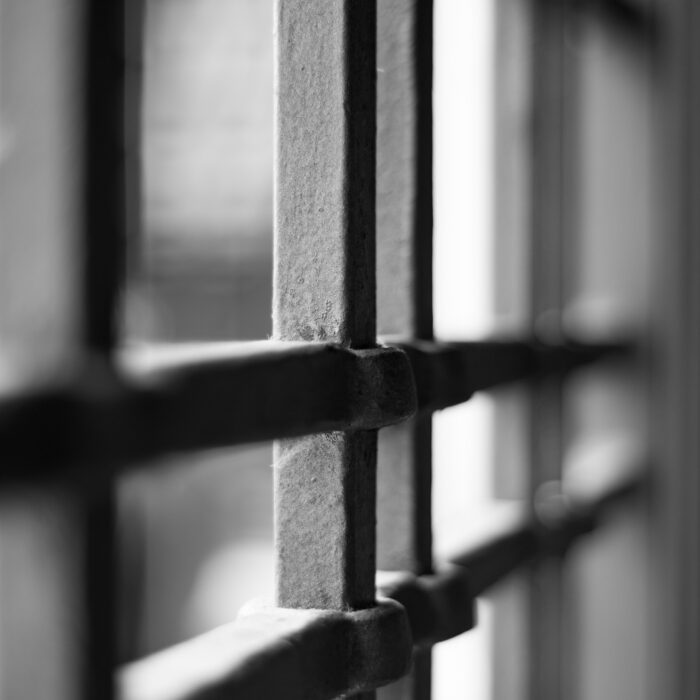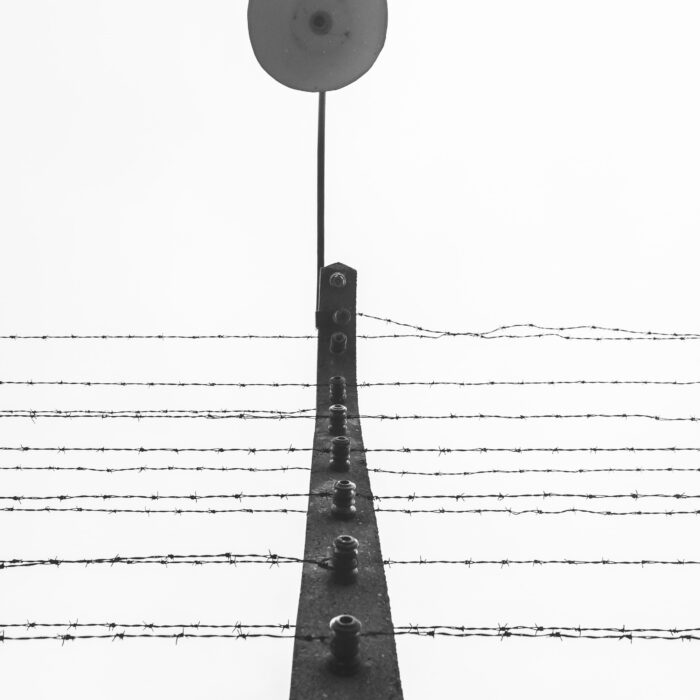You have no items in your cart. Want to get some nice things?
Go shopping
The blonde spent about half of each day out on that new porch. She was this pale little thing with gaunt eyes and tattoos on her calves, and she always had the baby in her arms – a beautiful little girl with black, curly hair. When the baby wasn’t on her mother’s hip she tottered along the planks trailed by a pack of yammering, clumsy young pups. Downstage in the yard, the husband worked on cars and motorcycles and tended to the adult Pit Bulls in the kennels.
The blonde’s father had built the porch. He’d re-lined the pool and then built the surrounding deck. And the fire pit. It was a big yard, and he was always there in the beginning. This wiry guy with white curls reaching out from beneath a blue baseball cap. He’d erected the fence and the covered dog kennels at the head of the driveway. He probably remodeled the inside of the house, too. It looked like they’d pretty much gutted the place after buying it, judging by the pile out near the road. Then, after the work was done, we just didn’t see him anymore – just the blonde and the baby and her husband and all his buddies. And the dogs.
Well, I didn’t see him anymore. Laurie didn’t really pay attention to any of that, and she wasn’t thrilled that I did. She’d started giving me the business whenever she caught me treating the kitchen window like a proscenium. And I’m not sure she appreciated seeing the baby paraded around like that, either. I mean, she’d been ready since we’d moved in together, and I’d been resisting ever since. And now these people had moved in with the baby and the puppies, and well it just didn’t help things. Not that I didn’t want a child. I just didn’t think it was smart. Not yet. I was still doing changeovers at the plastics plant, and what would she do? She couldn’t keep cleaning rooms and linens even part time at the Montfort, at least not for a while. Not with an infant. And it’s not like we could afford daycare. We had to be responsible, and she knew that, she’s smart, a heck of a lot smarter than me, and so we didn’t even talk about it anymore because we both knew how the conversation would end. Anyway, she probably didn’t like seeing that little girl out there, bouncing on her mother’s hip all day long. She probably didn’t like her mother either, or me looking at her mother, even though it wasn’t like that. For me it was more of a spectacle. It was more about the husband, really, and the racket they had running with the bikes and those dogs.
The husband was this stout Spanish guy with a beard and long black hair that he pulled into a small, tight ponytail. His buddies were always there, partying and yukking it up, revving their bikes and buggies and quads. Every afternoon was an extravaganza, a rally and barbecue rolled into one. At some point they’d all tear ass down the street, and then an hour later they’d roar back and it would start all over again. All the while, the blonde parading back and forth and sometimes resting in a patio chair with that baby.
Every. Damn. Day.
They also had a couple of old, black pugs that roamed the yard. Pets, not like the Pit Bulls – those were cash crops. The pugs were sweet little things. One night, one ended up at our place. I pulled in after my shift and opened the car door, and there she was, just sitting there in the road like she’d been waiting for me. Those big eyes, you know, full of ardor, like they’ve got something important to say or like they just need something so bad, something only you can give. I couldn’t see how she’d gotten through the fence, but it was dark and I didn’t really care. The dog was meat if she stayed out there in the road, and so I walked her back over, around to the front of the house and knocked on the door.
The blonde answered, opened the door just enough to give me this acrimonious look, like she wondered just what the hell I thought I was doing standing on her porch at that hour.
“This one’s yours, right?” I said and motioned toward the dog, who sat comfortably beside me in that way pugs do – legs out with their weight on one hip. “She got out. She was out in the road.”
“Gertie,” she said. “Get in here.”
The dog scurried in. While shutting the door, the blonde grumbled thanks and flashed a glance that said she thought something was clearly wrong with me.
When I slipped into bed, I kissed Laurie between the shoulder blades. She exhaled and rolled over and lay her head on my chest. I kissed her forehead and began telling her quietly about finding Gertie, that little face in the dark. She slid her hand across my body and up to my shoulder. I stroked her hair. Then she drew her hand south, and I stopped talking. The night had been long. I’d busted my hump at work to make sure first shift could run the new bottles on the main lines. And then the look on the blonde’s face. She didn’t need to look at me like that. The dog had been right next to me, for Christ’s sake. Treated me like I was the dog – or one of the goons in the yard. First words we’d ever spoken to one another and she does that. God, Laurie would have loved it. But if that dog could talk. Then we’d hear some real gratitude.
I needed to decompress. I slowed my breathing and thought about my body, one part at a time. First my feet. Heavy. Done for the day. Then my calves. Thighs. Hips. Shut it all down. Then Laurie’s hand stopped, and I heard her sigh as she rolled over, pulling the covers and settling into sleep with her back to me.
*
Laurie called me on my lunch break the following night to tell me the police had closed the road at the corner, that they had the house next door surrounded. Said she figured I’d want to know, but I could tell from her voice that it was an ordeal and that she really just wanted to tell someone. They’d fought plenty of times over there, the blonde and her husband. Usually it was just yelling that boiled over onto the deck, which was normal enough, not to judge or anything like that. This time, though, things had become physical. The police had taken the husband with a gash across his shoulder and chest. But it was the blonde who then tried fighting the officers. They ended up using a stun gun on her. Laurie said the girl was a whirlwind of arms and legs in the road right up until the moment they shot. Then she was down, just down, and everything became quiet. The next day, the newspaper said that she’d called the police because her husband had pulled a handgun on her.
That day the house was dark. The driveway was empty. The blonde, the baby, and the husband – all gone. The buddies, too. But the dogs were still there, and that worried me. Noon came and neither of us had seen anyone stop by. Laurie thought I was crossing a line when I said I wanted to go in and feed them.
“It’s not your place,” she said. “Besides, they have to have somebody feeding them. You’ve seen the way they are with those dogs. It’s his business.”
“I think that guy has more than his dog business to worry about.”
“What does that even mean?”
“I’m just saying the guy’s clearly hustling. I mean with the dogs, and the bikes – you don’t think he’s doing all that work for free, do you? And everything in cash no doubt. And he gets his wife’s father to renovate the entire place?” I wagged a thumb toward the kitchen window. “Come on.”
That’s when Laurie folded her arms. “So that’s it? You feel sorry for her?”
I set my hands on my hips and bobbed my head side to side the way I do when I have no idea what I’m supposed to say. “Kind of. I guess. Yeah.”
She smiled one of her smiles, that I’ve learned have absolutely nothing to do with whatever I think they might mean, and looked out the window at that empty home and then walked into the living room. “Fine. Go feed the dogs.” She sat on the recliner and put her feet up. “But don’t go in that house.”
“I’m not going in the house,” I said as though it were just a really stupid statement. I mean, it wasn’t like the house would just be left open anyway. Like, who would do that? Leave it open so someone could just go in and take … whatever they had in there? The pugs?
The pugs.
“But what about the pugs?” I asked in earnest.
“You’re fucking kidding me. The pugs?” She shivered, like she had suffered some kind of mental glitch that threw her brain offline and forced her to refresh. “You understand that you can’t break into someone else’s house, right” she said, “like, no matter how noble you think your ridiculous-ass intentions are. I mean, for fuck’s sake, Carl, it hasn’t even been twenty-four hours.” She stood and started walking away. “They probably have a lot to manage, you know, with getting arrested and probably trying not to lose their child.”
I followed. “But what if the door’s unlocked? Can’t I just feed the damned dogs, give them some water? They need water.”
She stopped and turned. She was working to hold it together. Could see it in her jaw. “Then call the cops and tell them so they can send someone over to take care of it.”
Call the cops. They’re the ones who tased the poor girl after that jackass pulled a gun on her. Yeah, sure, I’ll call them.
*
That night when I got home from work, Laurie had left the small table lamp burning in the front window, her way of letting me know that she had already gone to bed but that I had a plate made and waiting in the microwave. I sat in the car. The house next door was still dark and empty. Those animals didn’t deserve to be left alone without provisions, even for a day. They couldn’t tell that it was probably temporary. They can’t tell those sorts of things. They only knew what they knew: they’d been left alone and they didn’t have what they needed.
And so I went.
The dogs roused as I entered through the gate, but they never barked. They just approached the fence and watched. I hadn’t seen them up close before. Each one was massive – short, but just impressively wide. Something about their shapes in that darkness reminded me of pictures I’d seen of alligator snapping turtles. Feeding them was easy enough. Each pen had one of these rotating bowl sets built right into the fence. The hose was right there at the side of the house and they had plastic barrels filled with food. The dogs waited patiently while I filled the bowls. Then, from the end of the line I watched all eight drink in unison.
It was then I thought of the pugs, I couldn’t just leave them, not if I could get to them and when I’d fed all of the others. They’d need water, too. They deserved water.
Turning that back-door handle felt like scratching off a lottery ticket. I hoped and hoped and as it rotated my heart raced and a rush ran up the back of my neck into my skull. Laurie couldn’t blame me for this. She disapproved on principle, sure, but when all was said and done and those dogs had been cared for, she’d see it differently. She’d see that I was a caretaker – a father – at heart.
My first step into that dark kitchen was met with a flurry of paws on linoleum, followed by collisions with small, warm bodies as they barreled past my legs, and ultimately out the door. I caught my balance and looked in time to watch two small backsides disappear down the porch steps and into the yard.
Now, I’d closed the gate behind me, so I didn’t run immediately after them. I knew better, but Gertie had managed to get out once, so I knew I couldn’t waste too much time. I found a large bowl on the kitchen floor and filled it from the sink. Then I grabbed a ceramic bowl from the counter and filled it from the barrel outside. Then I went out to collect.
Luckily for me, pugs aren’t what you might call runners.
I spotted the first one sniffing through the grass near the pens, possibly looking for a spot to do its business but I wasn’t waiting. I scooped it up under my arm and brought it right back to the kitchen. One done; on to number two. At first I couldn’t see the other one. I walked the perimeter of the fence, worked to keep my gaze away from the streetlight so my vision would adjust to the darkness, and a minute later I saw it trotting near the fire pit. I gave a low whistle and patted my thigh, and the dog came right over. Such a good dog. I petted its head and I couldn’t be sure if it was Gertie or if the other one had been. Still, I picked it right up and it was back to the kitchen for that one, too. On the porch, I set the dog down right in front of the door and crouched behind it, cracked the door, and pushed the little bugger inside.
The hay was in the barn.
In our microwave was a heaping plate of Rice-A-Roni with pork chops and stewed tomatoes. I heated it until it steamed and then sat down with it on the recliner. When I eased into bed beside Laurie, she didn’t budge, and I don’t even remember my head hitting the pillow.
*
In the morning, there was a pug floating in the pool.
Laurie woke me up to tell me. She’d seen it, this thing, while getting ready for work. A mass of black something. Maybe some foliage or a garment, she hoped. But it looked like an animal. There weren’t any stairs descending into the pool, just a ladder. Whatever it was that went in, it never made it out. She said she really hoped it wasn’t a dog, but I knew as soon as I looked out the window. I think she did, too.
“Let me go take a look,” I said.
I stood poolside with my hands on my hips. I could hear the other dogs as they paced in their kennels. The dog in the pool floated near the middle, its four legs extended downward. Probably exhausted itself trying to get out. I’d always considered drowning to be one of the worst ways to go, but to surrender out of exhaustion? I couldn’t – just, no. And I just couldn’t figure it out. I had definitely gotten both dogs inside. I went to the back door and tapped on the glass. Two pugs scampered into the kitchen from the far end of the room and began scratching at the door. I looked at them and then at the dog in the pool, and then back at them to make sure I was seeing correctly. It didn’t make sense, so much that I became disoriented. Something had gone wrong with the world. The ground seemed to get closer and then farther away and then I grabbed the railing to steady myself.
Unless there had been three. Oh, God. There had been three.
Back inside, Laurie’s face said it all, and I realized she had figured everything out before waking me. She didn’t require anything more from me at that point, no admission or explanation, just my face as confirmation. Hers was disappointment and regret and anger and hurt and a measure of pity. She needed me to see what I had done. “Gertie,” I said. And then she stepped forward and leaned her forehead against my shoulder. And so maybe there was love, too. Anger and pain and shame and regret and love.
And then maybe I heard a car pull into the driveway next door but I didn’t look to the window. I just stared back at Laurie and I didn’t know if it was the police or the blonde or the husband or one of the friends, or the blonde’s father. It would have to be the father, I figured. He’d get out of the car and immediately see the dog in the pool. He’d draw it in with the skimmer, wrap it in a sheet and bury it, and he’d curse himself for not building those stairs. He’d probably come knocking on the door, too, all of our doors, right down the line, asking with clear, honest eyes if we’d seen anything. And I’d stare at him a long while before telling him the truth, before spilling it, that I had been trying to help but had screwed it up. Screwed it up big time. And he’d understand and be beyond disappointed but wouldn’t get angry. Not worth it, he’d know. He was someone who had raised a child and suffered idiots and knew better. But he’d wear the hurt on his face, in the lines around his grey eyes and mouth. And I’d see something in how he looked at me, the same look I’d felt myself giving Gertie that night in the road. This poor animal, I’d thought at the time. Helpless thing, knowing only what it thought it knew, wandering out in the dark where nothing good comes to the ignorant. Something so unequipped, incapable of even getting itself home.
Chris Cascio
Chris Cascio's writing and visual art has appeared in The Southampton Review, Sand: Berlin's English Literary Journal, The Northern Virginia Review, Peregrine Journal, Longridge Review, and elsewhere. He teaches writing at Monroe College and also works as a freelance editor and portrait artist. He currently lives in Larchmont, NY.




